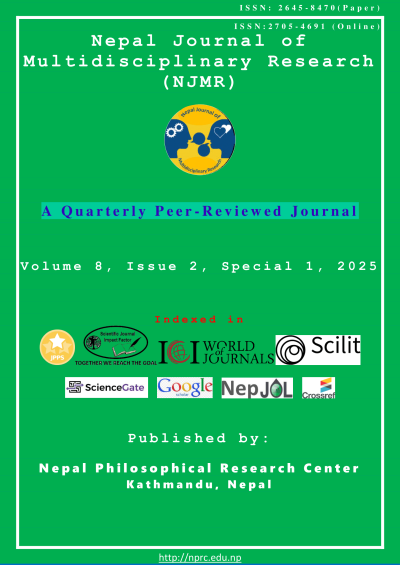Unethical Research Practices in Nepal: The Dark Side and the Ethical Solutions Ahead
DOI:
https://doi.org/10.3126/njmr.v8i2.78023Keywords:
Research ethics, academic integrity, data fabrication, peer review, NepalAbstract
Background: Academic research in Nepal is growing, but ethical issues remain significant challenges. This study explores unethical practices, their root causes, and proposes solutions to improve research ethics in Nepal.
Methods: A qualitative exploratory approach was used, involving semi-structured interviews with 11 experts, including professors (3), academic researchers (6), and journal editors-in-chief (2). Purposive sampling ensured diverse perspectives from individuals actively engaged in Nepal’s research ecosystem. Data were analyzed thematically to identify recurring ethical concerns and practices.
Results: The study uncovered widespread unethical practices such as data falsification, gift authorship, bypassing ethical reviews, biased peer review, unregulated AI use, and research driven by career incentives with limited societal impact. Additional issues include poor research communication, improper data disposal, unethical sampling, non-compliance with journal guidelines, and reliance on outdated analytical tools. These challenges arise from weak institutional oversight, limited awareness, and a "publish-or-perish" culture.
Conclusion: The study recommends implementing reforms such as mandatory data verification, clear authorship guidelines, and cross-disciplinary ethics committees. These measures aim to align Nepal’s research practices with global standards while addressing local challenges.
Novelty: This study provides the first comprehensive examination of unethical research practices in Nepal, offering context-specific, actionable solutions to improve research ethics in resource-constrained settings.
Downloads
Downloads
Published
How to Cite
Issue
Section
License
Copyright (c) 2025 The Author(s)

This work is licensed under a Creative Commons Attribution-NonCommercial 4.0 International License.
This license enables reusers to distribute, remix, adapt, and build upon the material in any medium or format for noncommercial purposes only, and only so long as attribution is given to the creator.




